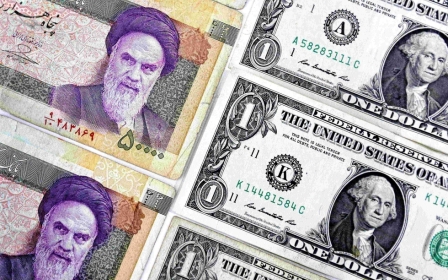'Sad and scared': Iranians fear return to life under US sanctions

The unfufilled promise of a more prosperous era has gnawed away at Iranians ever since the decades-old international sanctions that they suffered under were lifted in 2015. That disgruntlement has turned to fear.
Iranians who had hoped grinding limitations on food and medicine, high prices and unemployment were ending are now anxious about the possiblity of an economic crash after US President Donald Trump dropped the Iran nuclear deal and signed orders to revive sanctions.
"Everyone I speak to in Iran is sad and scared of what is going to happen. And then there's also the fear of war, which is the worst scenario," Iranian-American commentator Negar Mortazavi told Middle East Eye.
Mortazavi said that while frustrations brewed in recent years about the limited economic progress in the country, "people at least had hope". That hope will now be dashed as they are haunted by the memories of living under sanctions.
Iranians travellers have become drug stores for their friends and families, carrying medicine across borders
- Negar Mortazavi, Iranian-American commentator
"The ordinary Iranian was basically the main loser, and now they're fearing that it's going to happen again," said Mortazavi.
Though food and medication were exempt from sanctions, in practice restrictions on other sectors meant getting anything from foreign sources became difficult, largely due to restrictions on banks and imports of "dual-use" chemicals.
"To this day, still some Iranians are saying that Iranian travellers have become drug stores for their friends and families, carrying medicine across borders," she said.
The signs of economic instability became increasingly apparent as Trump's decision on withdrawing from the nuclear deal signed with world powers in 2015 to limit Iran's nuclear capabilities drew nearer.
More than $30bn in capital was taken out of the country in recent months, the currency fluctuated wildly and banks reported a rush of customers withdrawing savings they feared could be lost.
"One relative said he could see himself taking money out of the bank because he's worried about banks going bankrupt," said Iran analyst and curator of the Iranist newsletter Holly Dagres.
"I have been talking to friends and family in Iran. The majority are worried about the economy. Some are putting their faith in what Europe plans to do in the coming weeks."
Europe to the rescue?
For Iran, Europe's role could be key; unlike the US, it has remained committed to the nuclear deal and has refused to reimpose sanctions, potentially weakening the impact of Trump's move.
French Foreign Minister Jean-Yves Le Drian offered hope when he said Europe had to maintain its independence from US policy, especially because of the impact US sanctions could have on European companies doing business with Iran.
"We're telling the Americans that it's their business what sanctions they impose, but we consider the extraterritoriality of these measures unacceptable," Le Drian said. "Europeans should not have to pay for US withdrawal from an agreement."
Reuters reported that French exports to Iran doubled to $1.8bn last year, driven by the export of jets and aircraft parts, as well as automobile parts, according to customs data.
The International Crisis Group think tank argued in a report published earlier in May that Europe could save the nuclear deal, intended to stop Iran developing nuclear weapons, by building trade with the country.
"This aim could be achieved through a package of incentives aimed at persuading the Iranian leadership that the benefits of remaining compliant with the JCPOA [the nuclear deal] outweigh the potential costs of noncompliance and retaliation," the report said, suggesting energy partnerships, the protection of certain sanction-linked industries and more visas for Iranian students and business people.
State of the economy
Though Iran has signed off on multi-billion dollar aviation contracts and welcomed car manufacturers that have both provided jobs and cheaper vehicles to the population, there has also been a nagging question about how much the economic benefits have trickled down to the person in the street, she said.
"Now that the sanctions are being put back in place, the hardliners will have the best excuse to just blame everything on outside and Iranians will start to blame sanctions on at least part of the weaknesses in the economy."
This article is available in French on Middle East Eye French edition.
Stay informed with MEE's newsletters
Sign up to get the latest alerts, insights and analysis, starting with Turkey Unpacked
Middle East Eye delivers independent and unrivalled coverage and analysis of the Middle East, North Africa and beyond. To learn more about republishing this content and the associated fees, please fill out this form. More about MEE can be found here.




